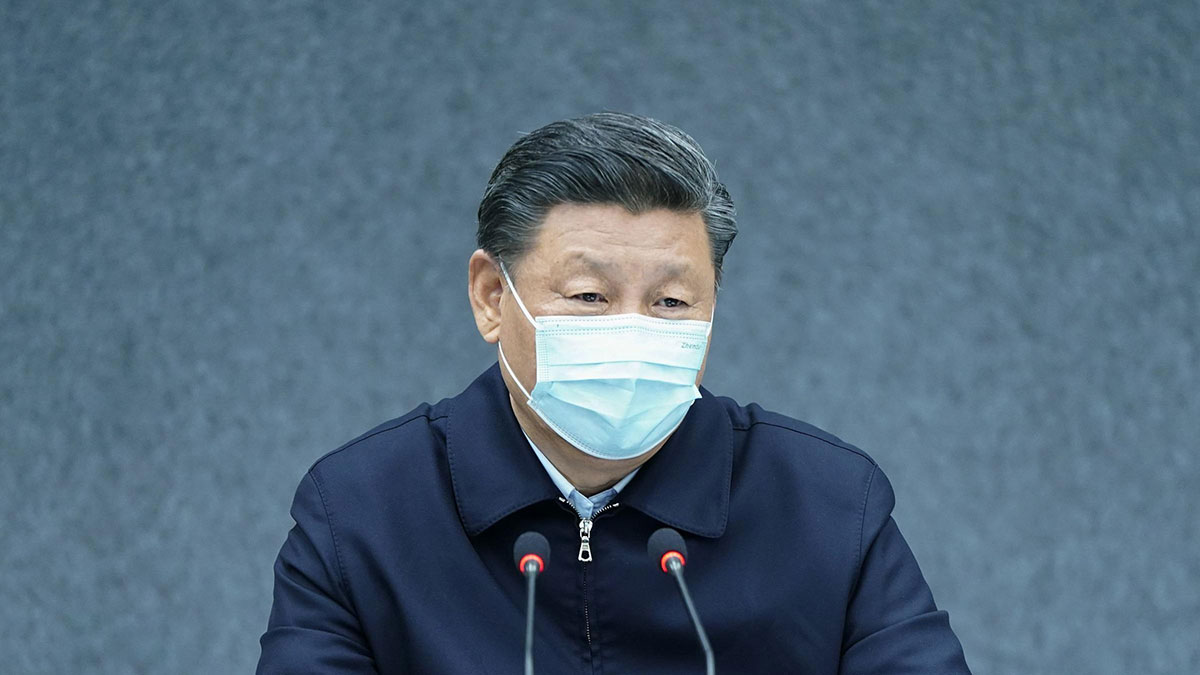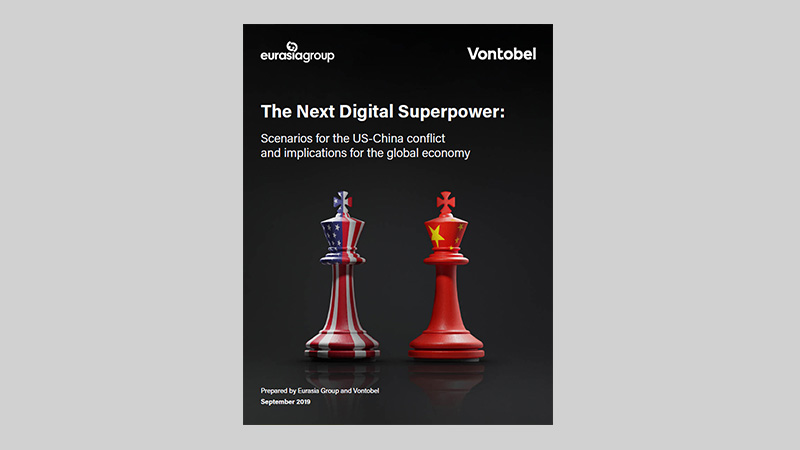Latest white paper on the power poker China vs. USA
Who will be the superpower in the digital age? And how? 3 scenarios from escalation to de-escalation.

At the end of January 2020, China came under the spotlight of the media world. The spread of the coronavirus forced the country to place millions of people under house arrest. Two months later, China now seems to be doing everything it can to present itself as a saviour in the fight against the virus.

The Chinese head of state Xi Jinping is now trying to become an international fighter against the coronavirus ©depositfotos
The city of Wuhan was locked on January 23, as were three surrounding cities, but not before five million people managed to leave the area at the centre of the epidemic without being screened for the disease. The next day, the government put the entire 57-million-person area of Hubei province under lockdown. It was, however, too late to contain the spread of Covid-19 from becoming a global pandemic that has, to date, infected over 600,000 people and cost over 27,000 lives in 199 countries. Had China acted three weeks earlier to contain the disease, a report in March noted, it could have reduced the number of infections by 95 per cent and contained the global spread.
China’s subsequent response, once it decided to enact the full lockdown of Hubei and institute at least partial lockdowns of a population of over 750 million, has eventually proven effective at containing the virus. On March 19, China announced that it had no new domestically transmitted cases of novel coronavirus (though there is dispute over these numbers). China has now banned all foreigners from entering the country, regardless of residency status or visa class, as the greatest risk to the country is now imported cases.
After essentially shuttering its economy for two months, closing everything from large-scale industrial factories to small bubble-tea shops, the Chinese economy is picking up again. A recent headline in Xinhua, the state news agency, extolled the “roaring Chinese factories in full swing,”.
After this reversal of fortune China has gone on a PR campaign, celebrating its success as the rest of the world is descending into chaos trying to fight off the virus. So far China has provided assistance to 89 countries and four international organisations to fight against the novel coronavirus, according to the China International Development Cooperation Agency.
When European countries dawdled before answering Italy’s urgent appeal for medical equipment and protective gear, China preceded them by publicly committing to sending 1,000 ventilators, two million masks, 100,000 respirators, 20,000 protective suits, and 50,000 test kits. “We will remember those who were close to us in this difficult period,” Luigi Di Maio, Italy’s foreign minister, said last week. China also dispatched medical teams and 250,000 masks to Iran, one of the countries worst affected by the virus. Serbian president Aleksandar Vučić dismissed European solidarity as a “fairy tale” and praised his “brother and friend Xi Jinping” for coming to the country’s aid. “The only country that can help us is China,” he concluded.
At the G-20 summit last week, convened by Saudi Arabia and hosted online via video-conferencing technology, China’s president attempted to grab the reins of the international response and showcase China’s expertise in combating the infection. “All must work together to build the strongest global network of control and treatment that the world has ever seen,” Xi told the meeting, noting that China had set up its online Covid-19 knowledge centre to provide information to all nations to combat the spread of the virus. "This is a virus that respects no borders," he said.
China is in a unique position to help the global community now not least because – on top of the expertise it has gained in already containing the disease – it has created vast excess capacity to churn out medical equipment. While Donald Trump wavers in America over whether to enact wartime powers to force manufacturers to build ventilators, Chinese factories already have orders keeping them at full capacity, running 24/7, until May. China, which was already the world’s top manufacturer of masks, increased its capacity by tenfold and is now in a position to meet global demand, if the political will arises to start exporting.
As Guo Dingping, professor of political science at Fudan University in Shanghai noted: “China has pushed for an international response to the virus, has offered as much help as is at its disposal and is hoping for a coordinated fight against this pandemic on a global scale.” Many in the international community, however, worry that China is posturing in order to shirk taking full responsibility for its initial mishandling of the virus. We have seen China try to rewrite the past, wrote the author Louisa Lim in a Foreign Policy article, but now we are watching China “rewriting the present.” Of course, the biggest boon for China’s plans has been the shambolic response to the virus in the West, a fact best epitomised by the fact that both Boris Johnson and Prince Charles have managed to contract the infection, and that the US economy has been hit so hard that it has had to launch the largest fiscal stimulus package in history: $2 trillion. Death tolls in countries such as Italy and Spain now outnumber those of China, and Switzerland has the highest per-capita rate of infections in the world.
What is now playing out in the West is a restaging of the tragedy that played in Wuhan, if possibly worse. Just as nurses in Wuhan broke down and pleaded for masks and protective equipment in February, New York just lost its first nurse to the virus in a hospital where workers had fashioned bin-liners as protective gear. Economies globally have ground to a halt, schools have closed, and thousands are dying in scene-by-scene replays of the Wuhan crisis. Just as residents in Wuhan took to their windows to sing to get through the tedium of their lockdowns, so too have people in cities across Italy and Spain. Countries in the West failed to adequately prepare for the coronavirus partly because their leaders refused to believe that what had happened in Wuhan could ever happen in their own nations. This has given credence to the Chinese government’s narrative that they bought the world time, and that the world squandered it.
Li Wenliang, the ophthalmologist who was censured by the local government in Wuhan, contracted the coronavirus and died on February 7, going on to become something of a martyr in the country. “The domestic debate in China entirely replicates the international reaction to the management of the virus,” says Kevin Rudd, president of the Asia Society Policy Institute and former Prime Minister of Australia. “People have been extremely critical of the communist system’s ability to protect people like Li Wenliang and to take his advice seriously. At the same time, only China could react to the virus in the way that they did and contain it in such dramatic fashion.”
The world is therefore in a tricky bind. It can be simultaneously true that China is responsible for its initial failures in managing the spread of Covid-19, and also that it is now uniquely positioned to help other nations in their fight against the disease. “The bottom line of international diplomacy is to solve the problems that we now face. What’s needed is Chinese big data, establishing the efficacy of various treatments for Covid-19 as well as of course the big data needed for effective vaccine testing,” Rudd says.
Hampering these efforts has been a Twitter mud-slinging match between the Chinese Ministry of Foreign Affairs (MFA) and the US president over the origin of the virus. Zhao Lijian, a spokesman for the Chinese MFA, tweeted out a conspiracy theory that had been doing the rounds in China according to which the virus was first spread by an American soldier travelling on Wuhan’s underground. The tweet was shared in various forms by other accounts affiliated with the MFA, and further spread by Chinese state media. The claims received widespread international condemnation and had to be walked back a few days later by the Chinese ambassador to the US, Cui Tiankai. The claim was “crazy”, he said, when pressed in an interview with Axios on HBO.
Trump, who has consistently referred to Covid-19 as the “Chinese virus” doubled down on the use of the term in response to the baseless claims made by Zhao, refusing to moderate his language even after it was brought to his attention that doing so was putting Asian Americans at risk of racist attacks. “It’s not racist at all, no, not at all. It comes from China, that’s why. I want to be accurate,” Trump said. This political point-scoring over the origin of the virus is causing serious impediments to global cooperation to fight the disease. In recent days, talks among the UN Security Council nations over a joint declaration or resolution on the coronavirus have stalled over American insistence that it explicitly state that the virus originated in Wuhan, China, as well as exactly when it started there. China’s mission to the UN wrote that it was “astonished by the choice of the United States to use this opportunity for politicising the outbreak and blaming China, which we strongly oppose.” That same mission however was also seeking to have the language of the communique amended so that it praised China’s efforts to contain the virus.
On a sub-national level, there has been encouraging solidarity. Jack Ma, China’s richest man and the founder of Alibaba group, has been instrumental in getting aid to developing countries. Through his charitable foundation he has already ensured that each of Africa’s 54 nations will receive 20,000 testing kits, 100,000 masks and 1,000 protective suits for medical use. Subverting the political sniping at the international level, he also managed to ship a million masks and half a million testing kits to the United States. “Jack is much more adept at soft power than the government. His life story is one of soft power, if you think about it. If soft power is all about charm, charisma, punching above your weight – Jack has that in spades,” says Duncan Clark, author of the book Alibaba: The House that Jack Built. Ma is just the most visible character in a story that is playing out across China. In Bedburg, Germany, city officials received 50,000 masks dispatched from the city of Changsha with the German proverb “mountains and valleys don't come together, but humans do” written on the boxes; aid from a Chinese firm that has its European headquarters in Bedburg.
Barclay Bram is an editor of WiredUK

Who will be the superpower in the digital age? And how? 3 scenarios from escalation to de-escalation.